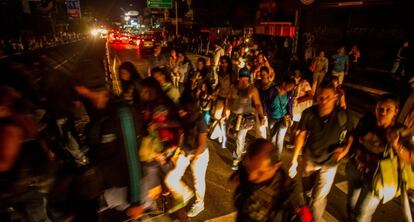Venezuelan government blames opposition for latest power blackout
Caracas and other major cities go dark after breakdown at substation

A massive power outage left Caracas and at least 10 Venezuelan states in the dark on Monday night, cutting off even a special broadcast of a public question-and-answer session given by President Nicolás Maduro on state-run television.
The blackout occurred at around 8.23pm, catching many Venezuelans on the rainy streets of the capital. It appeared to be similar to one that took place on September 3.
Power returned to most of the country by Tuesday morning but Venezuelan media said there were still spots without electricity in at least four states.
“I am in Miraflores [presidential palace] with my team following the strange power blackout that occurred at the same place as the last sabotage that occurred,” Maduro wrote Monday night on his Twitter account. He blamed “right-wing fascists” for the electrical cutoff.
In the affluent Caracas neighborhood of Cumbres de Curumo, residents began banging pots and pans out of their windows in protest against the deteriorating infrastructure and utility failures.
Officials from the Democratic Union Committee (MUD), which is the coordinating committee for the opposition parties, called the accusations absurd but expressed concern that the government could use this as an excuse to produce hysteria and chaos. “The president and his ministers do not hide their interests in wanting to place responsibility for the electrical crisis, without proof or presenting names, on opposition sectors to discredit us for pure political and campaign purposes,” said Manuel Guevara, MUD’s technical expert on electrical matters, on Tuesday.
The tensions come just before Venezuelans are due to head to the polls to vote in local elections on Sunday.
Electrical Energy Minister Jesse Chacón said the outage occurred at the San Gerónimo substation in the central plains, which connects with the massive Guri hydroelectric plant in Bolívar state and supplies 70 percent of the country’s power.
“This was a provocation,” Chacón said, adding that he found it strange that it occurred at the same location as the one in September which left 17 states in the dark.
“The grid had reached stabilized levels. There are no problems with demand and supply,” he said.
But Venezuela has been plagued by blackouts over the last few years as a result of power rationing and utility failures.
Miguel Rodríguez Torres, the interior minister, immediately placed the blame on the opposition despite the fact that all the power stations have been guarded by soldiers.
“We have information that radical groups from the right are preparing to sabotage the petroleum industry and provoke blackouts,” he said.
José Manuel Aller, an electrical consultant who has been linked to the opposition, has rejected the minister’s claims because there is no precise information on what exactly occurred. “Neither the September 3 blackout nor this latest one can be considered sabotage. It is nothing but communist incapability in destructive action,” Aller wrote on his own Twitter account in reference to Maduro’s left-wing government.
After about 85 percent of the electricity was restored in Caracas late Monday, Maduro appeared with a group of children at Miraflores who helped him light a nativity scene.
Tu suscripción se está usando en otro dispositivo
¿Quieres añadir otro usuario a tu suscripción?
Si continúas leyendo en este dispositivo, no se podrá leer en el otro.
FlechaTu suscripción se está usando en otro dispositivo y solo puedes acceder a EL PAÍS desde un dispositivo a la vez.
Si quieres compartir tu cuenta, cambia tu suscripción a la modalidad Premium, así podrás añadir otro usuario. Cada uno accederá con su propia cuenta de email, lo que os permitirá personalizar vuestra experiencia en EL PAÍS.
¿Tienes una suscripción de empresa? Accede aquí para contratar más cuentas.
En el caso de no saber quién está usando tu cuenta, te recomendamos cambiar tu contraseña aquí.
Si decides continuar compartiendo tu cuenta, este mensaje se mostrará en tu dispositivo y en el de la otra persona que está usando tu cuenta de forma indefinida, afectando a tu experiencia de lectura. Puedes consultar aquí los términos y condiciones de la suscripción digital.








































